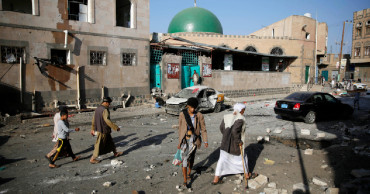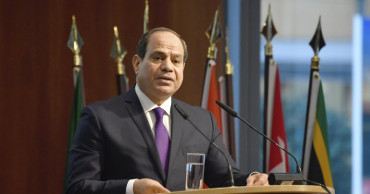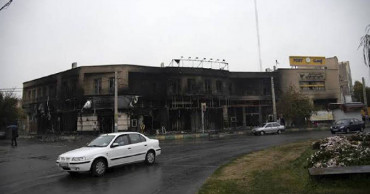Amnesty
Musk says granting 'amnesty' to suspended Twitter accounts
New Twitter owner Elon Musk said Thursday that he is granting "amnesty” for suspended accounts, which online safety experts predict will spur a rise in harassment, hate speech and misinformation.
The billionaire's announcement came after he asked in a poll posted to his timeline to vote on reinstatements for accounts that have not “broken the law or engaged in egregious spam.” The yes vote was 72%.
“The people have spoken. Amnesty begins next week. Vox Populi, Vox Dei,” Musk tweeted using a Latin phrase meaning “the voice of the people, the voice of God.”
Read more: Musk restores Trump’s Twitter account after online poll
Musk used the same Latin phrase after posting a similar poll last last weekend before reinstating the account of former President Donald Trump, which Twitter had banned for encouraging the Jan. 6, 2021, Capitol insurrection. Trump has said he won’t return to Twitter but has not deleted his account.
Such online polls are anything but scientific and can easily be influenced by bots.
In the month since Musk took over Twitter, groups that monitor the platform for racist, anti-Semitic and other toxic speech say it’s been on the rise on the world’s de facto public square. That has included a surge in racist abuse of World Cup soccer players that Twitter is allegedly failing to act on.
The uptick in harmful content is in large part due to the disorder following Musk’s decision to lay off half the company’s 7,500-person workforce, fire top executives, and then institute a series of ultimatums that prompted hundreds more to quit. Also let go were an untold number of contractors responsible for content moderation. Among those resigning over a lack of faith in Musk’s willingness to keep Twitter from devolving into a chaos of uncontrolled speech were Twitter’s head of trust and safety, Yoel Roth.
Read more: Musk gives remaining Twitter staff till Thursday to go “hardcore” or leave
Major advertisers have also abandoned the platform.
On Oct. 28, the day after he took control, Musk tweeted that no suspended accounts would be reinstated until Twitter formed a “content moderation council” with diverse viewpoints that would consider the cases.
On Tuesday, he said he was reneging on that promise because he’d agreed to at the insistence of “a large coalition of political-social activists groups” who later ”broke the deal” by urging that advertisers at least temporarily stop giving Twitter their business.
A day earlier, Twitter reinstated the personal account of far-right Rep. Marjorie Taylor Greene, which was banned in January for violating the platform’s COVID misinformation policies.
Musk, meanwhile, has been getting increasingly chummy on Twitter with right-wing figures. Before this month’s U.S. midterm elections he urged “independent-minded” people to vote Republican.
A report from the European Union published Thursday said Twitter took longer to review hateful content and removed less of it this year compared with 2021. The report was based on data collected over the spring — before Musk acquired Twitter — as part of an annual evaluation of online platforms’ compliance with the bloc’s code of conduct on disinformation. It found that Twitter assessed just over half of the notifications it received about illegal hate speech within 24 hours, down from 82% in 2021.
3 years ago
Myanmar releasing 4 foreigners in broad prisoner amnesty
Myanmar's military-controlled government announced Thursday it was releasing and deporting an Australian academic, a Japanese filmmaker, an ex-British diplomat and an American as part of a broad prisoner amnesty to mark the country’s National Victory Day.
Australian Sean Turnell, Japan's Toru Kubota, Briton Vicky Bowman, and American Kyaw Htay Oo, as well as 11 local Myanmar celebrities, were among a total of 5,774 prisoners who were being released, Myanmar's state-run MRTV reported.
The imprisonment of the foreign nationals had been a source of friction between Myanmar's leaders and their home governments, which had been lobbying for their release.
According to the Assistance Association for Political Prisoners, a rights monitoring organization, 16,232 people have been detained on political charges in Myanmar since the army ousted the democratically elected government of Aung San Suu Kyi in February last year.
Of those arrested, 13,015 were still in detention as of Wednesday, the AAPP reported. Additionally, at least 2,465 civilians have been killed by security forces in the same period, the group says, though the number is thought to be far higher.
Amnesty International Australia's Tim O'Connor welcomed the decision to release Turnell, saying like many others, he should never have been arrested or jailed.
UN adopts resolution on human rights of Rohingya, other minorities in Myanmar
“Amnesty continues to call for the release of all those arbitrarily detained for peacefully exercising their human rights," he said. “Thousands of people jailed since the coup in Myanmar have done nothing wrong.”
Japan's Foreign Ministry confirmed they had been informed of Myanmar's plans to release Kubota, but had no further details, other than that the 26-year-old Tokyo-based documentary filmmaker was reportedly in good health.
Britain's embassy in Yangon said Bowman had not yet been released from prison. Australian Foreign Minister Penny Wong tweeted that she welcomed reports of Turnell being released, but would not comment further for the time being, and the U.S. Embassy in Yangon referred queries to Washington.
Turnell, 58, an associate professor in economics at Sydney’s Macquarie University who had been serving as an advisor to Suu Kyi, was arrested by security forces at a hotel in Yangon just days after last year's military takeover. He was sentenced in September to three years in prison for violating the country’s official secrets law and immigration law. Suu Kyi and three of her former Cabinet members were convicted in the same trial, which was held in a closed court, with their lawyers barred by a gag order from taking about the proceedings.
Fellow Australian economist Tim Harcourt said in an email he was delighted to hear of his longtime friend Sean Turnell's release.
He thanked the Australian government, activists and Turnell's friends and colleagues who had lobbied for his release and said he was looking forward to him returning home to Sydney.
“It’s a great relief to his wonderful wife Ha, his sister and father and all the family," Harcourt said.
“Sean’s heart was with the people of Myanmar to help lift them about of poverty and help Myanmar reach its economic potential. He should never have been imprisoned for doing his professional duty as an economist involved in development economics,” he said.
Myanmar has been in turmoil since the takeover, which led to nationwide protests that the military government quashed with deadly force, triggering armed resistance that some U.N. experts now characterize as civil war.
Kubota was arrested July 30 by plainclothes police in Yangon after taking images and videos of a small flash protest against the military. He was convicted last month by the prison court of incitement for participating in the protest and other charges and sentenced to 10 years in prison.
Since seizing power, the military has cracked down on the coverage of protests, raided media companies, detained dozens of journalists and revoked the licenses of at least a dozen outlets.
Most of those detained are being held on the incitement charge for allegedly causing fear, spreading false news, or agitating against a government employee.
Some of the closed media outlets have continued operating without a license and many Myanmar journalists are working underground, moving from one safe house to another, hiding in remote border regions, or basing themselves in exile.
Kubota was the fifth foreign journalist detained in Myanmar after the military seized power. U.S. citizens Nathan Maung and Danny Fenster, who worked for local publications, and freelancers Robert Bociaga of Poland and Yuki Kitazumi of Japan were eventually deported before having to serve full prison sentences.
Bowman, 56, a former British ambassador to Myanmar who had been running a business consultancy, was arrested with her husband, a Myanmar national, in Yangon in August. She was given a one-year prison term in September by the prison count for failing to register her residence.
Kyaw Htay Oo, a naturalized American, returned to Myanmar, the country of his birth, in 2017, according to media reports. He was arrested in September 2021 on terrorism charges and has been in custody ever since.
Myanmar did not release many details of the other prisoners who were being freed, but almost all would have been being held on charges related to the protests, including Section 505(A) of Myanmar’s penal code, which makes it a crime to spread comments that create public unrest or fear or spread false news, and carries a penalty of up to three years in prison.
Among those released were also Kyaw Tint Swe, a former union minister for the office of the State Counsellor, Than Htay, a former member of the Union Election Commission and Lae Lae Maw, a former Chief Minister of Tanintharyi Region who had been jailed for 30 years for corruption since 2020 under Suu Kyi’s government, MRTV announced.
3 years ago
Amnesty warns COP27 could be dominated by jailed Egyptian-British activist's hunger strike
Amnesty International's head on Sunday warned that the proceedings of COP27 in Egypt could be stained by the death of one of the country's leading rights activists from a hunger and water strike in prison if Egyptian authorities do not release him within days.
Secretary General of Amnesty International Agnes Callamard said Egypt had no more than 72 hours to save the life of jailed dissident Alaa Abdel Fattah, who is also a U.K. citizen.
Egypt’s hosting of the climate summit, known as COP27, has trained a spotlight on its human rights record as a wide-reaching crackdown continues under President Abdel Fattah el-Sissi. The conference is being held in the Egyptian Red Sea resort town of Sharm el-Sheikh.
“If they do not want to end up with a death they should have and could have prevented, they must act now,” Callamard said at a news briefing in the capital Cairo.
Callamard said she will be attending COP27 to push for action on human rights issues related to climate change, including loss and damage or reparations from richer countries to vulnerable nations suffering from climate change. Egypt is a proponent of the issue.
Read more: COP27 climate talks begin as world grapples with multiple crises
But she will also be there to push for immediate action on the case of prominent Egyptian activist and U.K. citizen Alaa Abdel Fattah and that of the tens of thousands of political prisoners estimated to be inside the country’s jails, she said.
Opposition figure Abdel-Fattah escalated his hunger strike this week, refusing also water, to coincide with the first day of the COP27, according to his family. His aunt, the writer Ahdaf Soueif, said he stopped drinking water at 10 a.m. local time on Sunday, amid growing concerns about his health.
Alaa Abdel-Fattah hails from a family of well-known Egyptian activists and rose to prominence with the 2011 pro-democracy uprisings that swept the Middle East and in Egypt toppled long-time President Hosni Mubarak. The 40-year old activist spent most of the past decade behind bars and his detention has become a symbol of Egypt’s return to autocratic rule. For more than six months, he has been on a partial hunger strike, consuming only 100 calories a day.
In April, Abdel Fattah's family announced he had obtained British citizenship through his mother, Laila Soueif, a math professor at Cairo University who was born in London. The family has criticized U.K. leaders for failing to push harder for a consular visit to him in the detention facility.
On Sunday, his family released a letter they had received from the U.K.'s Prime Minister Rishi Sunak, who will be attending COP27. The letter said the global summit is an opportunity to raise Abdel Fattah's case “with the Egyptian leadership.” Sunak will "continue to stress to President (el-Sissi) the importance that we attach to the swift resolution of Alaa’s case and an end to his unacceptable treatment," it added.
The prime minister's office confirmed the contents of the letter.
Read more: Health must be at the centre in COP27 climate change negotiations: WHO
Abdel-Fattah's younger sister, Sanaa Seif, meanwhile, landed in Sharm el-Sheikh early Monday, coming on a flight from London through the Turkish city of Istanbul, her family said.
“I’m here to do my best to try and and shed light on my brother’s case and to save him,” Seif said upon her arrival. “Today (Sunday) he took his last glass of water, so it’s a matter of hours. I’m really worried. I’m also here to put pressure on world leaders coming.”
She is expected to take part along with Callamard in Egypt's human rights situation on the sidelines of the COP27. Seif, also a rights defender who had been imprisoned for one year over charges of spreading false news and insulting a police officer, will focus on the case of her brother and other jailed activists.
Seif, who is also a British citizen, had staged a sit-in at the headquarters of Britain’s Foreign Ministry in recent weeks, part of a rallying campaign to push the U.K. to take action in her brother's s case.
Since 2013, el-Sissi, a U.S. ally with deep economic ties to European countries, has overseen a massive crackdown, jailing thousands of Islamists, but also secular activists involved in the country’s 2011 uprising. Many other activists, journalists and academics have fled the country.
Amnesty also said Sunday it had documented a new wave in the government’s crackdown. There have been 766 Egyptian political prisoners released in the run-up to the conference, Callamard said, according to the group’s figures. She added that more than 1,500 people have been arrested since April, including more than 150 in just the past two weeks.
The latest sweep came after the Muslim Brotherhood, designated a terrorist group and driven largely into exile, called for anti-government protests on Nov. 11, aiming to take advantage of Egypt’s worsening economic hardships and global attention on COP27.
Other rights groups also criticized Egypt on Sunday for restricting protests and stepping up surveillance during the summit.
New York-based Human Rights Watch said it had had joined about 1,400 groups from around the world urging Egypt to lift the restrictions on civil society groups, and also expressed concern about the new rounds of arrest.
“It is becoming clear that Egypt’s government has no intention of easing its abusive security measures and allowing for free speech and assembly,” Adam Coogle, the group’s deputy director for the Middle East and North Africa, said in a statement.
3 years ago
Amnesty: Taliban crackdown on rights is 'suffocating' women
The lives of Afghan women and girls are being destroyed by a “suffocating” crackdown by the Taliban since they took power nearly a year ago, Amnesty International said in a report released Wednesday.
After they captured the capital, Kabul, in August 2021 and ousted the internationally backed government, the Taliban presented themselves as having moderated since their first time in power, in the 1990s. Initially, Taliban officials spoke of allowing women to continue to work and girls to continue their education.
Instead, they formed an all-male government stacked with veterans of their hard-line rule that has banned girls from attending school from seventh grade, imposed all-covering dress that leaves only the eyes visible and restricted women's access to work.
Amnesty said the Taliban have also decimated protections for those facing domestic violence, detained women and girls for minor violations and contributed to a surge in child marriages. The report also documented the torture and abuse of women arrested by the Taliban for protesting against restrictions.
“Taken together, these policies form a system of repression that discriminates against women and girls in almost every aspect of their lives,” the report said. “This suffocating crackdown against Afghanistan’s female population is increasing day by day.”
The group's researchers visited Afghanistan in March as part of a nine-month-long investigation conducted from September 2021 to June 2022. They interviewed 90 women and 11 girls, between 14 and 74 years-old, across Afghanistan.
Among them were women detained for protesting who described torture at the hands of Taliban guards, including beatings and threats of death.
Read: Hope and despair: Kathy Gannon on 35 years in Afghanistan
One woman told Amnesty that guards beat her and other women on the breasts and between the legs, “so that we couldn’t show the world.” She said one told her, “I can kill you right now, and no one would say anything.”
A university student who was detained said she was electrically shocked on her shoulder, face, neck and elsewhere, while the Taliban shouted insults at her. One held a gun at her and told her, “I will kill you, and no one will be able to find your body.”
The report said rates of child, early and forced marriage in Afghanistan are surging under Taliban rule.
The increase, Amnesty said, is fueled by Afghanistan’s economic and humanitarian crisis and the lack of education and job prospects for women and girls. The report documented cases of forced marriages of women and girls to Taliban members — under pressure by the Taliban member or by the women’s families.
One woman from a central province of Afghanistan told Amnesty that she was compelled her to marry off her 13-year-old daughter to a 30-year-old neighbor in exchange for 60,000 Afghanis (around US$670). She said she felt relieved because her daughter “won’t be hungry anymore.”
She said she was also considering the same for her 10-year-old daughter but was holding off in hopes the girl could get an education and eventually secure a job to support the family. “Of course, if they don’t open the school, I will have to marry her off,” she added.
“You have a patriarchal government, war, poverty, drought, girls out of school. With all of these factors combined … we knew child marriage was going to go through the roof,” said Stephanie Sinclair, director of Too Young to Wed, who was quoted in the report.
The Taliban seized Kabul as U.S. and NATO forces were withdrawing from Afghanistan, ending a nearly 20-year war against the Taliban’s insurgency. The world has refused to recognize the Taliban's rule, demanding it respect human rights and show tolerance for other groups. The U.S. and its allies have cut off billions in development funds that kept the government afloat, as well as froze billions in Afghan national assets.
This sent the already shattered economy into freefall, increasing poverty dramatically and creating one of the world’s worst humanitarian crises. Millions, struggling to feed their families, are kept alive by a massive U.N.-led relief effort.
Amnesty called on the international community to take action to protect Afghan women and girls.
“Less than one year after the Taliban’s takeover of Afghanistan, their draconian policies are depriving millions of women and girls of their right to lead safe, free and fulfilling lives,” said Agnès Callamard, Amnesty secretary general.
“If the international community fails to act, it will be abandoning women and girls in Afghanistan, and undermining human rights everywhere,” she said.
3 years ago
Amnesty demands immediate release of school teacher Hriday
Amnesty International has urged the Bangladeshi authorities to "immediately and unconditionally" release Hriday Chandra Mondal, a schoolteacher who was arrested on charges of “hurting religious sentiment” after he discussed in the classroom the distinction between religion and science.
“Hriday Chandra Mondal must be released immediately and unconditionally,” said Smriti Singh, Deputy Regional Director for South Asia at Amnesty International, a UK-based global rights group.
Hriday's detention is "emblematic of a disturbing trend in Bangladesh where the space for free expression is rapidly shrinking. Detaining a teacher for simply discussing ideas in class sets a dangerous precedent where even challenging students to think critically can now land someone in jail," said Singh.
She said Amnesty International has been documenting a growing sense of fear among people in Bangladesh stemming from the arbitrary detention and growing criminalization of the right to freedom of expression.
Hriday’s case only exacerbates the situation and represents a direct threat for one of the last bastions of free expression in the country, said the statement.
Several civil society and academic organizations, including the Bangladesh Astronomical Association and the Centre for Women Journalists, have condemned the arrest and raised concerns about the ability of academics to teach.
Similarly, human rights defenders, lawyers and teachers around the country have raised questions about the time of the arrest, which according to them appears to be politically motivated.
READ: Amnesty International urges speedy probe into Rohingya leader Mohib Ullah's killing
“Hriday Chandra Mondal’s detention is a shameful demonstration of the erosion of the human rights situation in Bangladesh. The authorities must take urgent measures to improve the conditions that allow people to express freely and safely, and ensure that teachers can speak freely in class without fear of reprisals,” said Singh.
In the discussion at school, where teachers should be free to discuss any ideas or facts without fear of reprisals, the teacher argued that “religion is a matter of faith” while “science looks at evidence”, according to a recording that was filmed by [a student/someone in the class and?] shared on social media.
In the audio recording accessed by Amnesty International, the teacher said: “There is no evidence in religion. Religion in the end says God will take care of everything. Religion offers memorized words whereas science shows evidence”.
On 22 March, two days after the recording was made, the school’s headteacher told the media that students and other people from the community were demonstrating outside the school calling for punishment for Hriday.
Later that day, an office assistant of the high school filed a case before the police against the teacher, who was subsequently arrested. He has since been held in judicial custody after being denied bail twice.
The next bail hearing is scheduled for 10 April 2022 at the District and Sessions Judges Court.
3 years ago
Amnesty report describes Axum massacre in Ethiopia’s Tigray
Soldiers from Eritrea systematically killed “many hundreds” of people, the large majority men, in a massacre in late November in the Ethiopian city of Axum, Amnesty International says in a new report, echoing the findings of an Associated Press story last week and citing more than 40 witnesses.
5 years ago
Amnesty: Yemen's disabled are neglected, and suffering
Yemen's civil war has exacted an enormous toll on people with disabilities, who find themselves on the margins of society and excluded from badly needed humanitarian assistance, Amnesty International said in a report released Tuesday.
6 years ago
Amnesty: Egypt uses prosecution branch to crush dissent
Egypt's government is using a secretive judicial agency designed to fight terrorism to detain peaceful protesters, journalists and critics on trumped-up charges without trial, Amnesty International said in a report released Wednesday.
6 years ago
Amnesty: At least 106 dead in protests, which Iran disputes
Days of protests over rising fuel prices and a subsequent government crackdown have killed at least 106 people across Iran, Amnesty International said Tuesday, adding that the real figure may be much higher.
6 years ago















